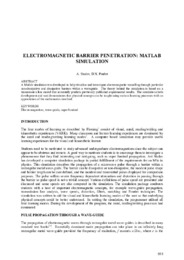| dc.contributor.author | Shalav, A. | en |
| dc.contributor.author | Pinder, D.N. | en |
| dc.coverage.spatial | CY - Λευκωσία | en |
| dc.creator | Shalav, A. | en |
| dc.creator | Pinder, D.N. | en |
| dc.date.accessioned | 2016-02-22T09:23:51Z | |
| dc.date.available | 2016-02-22T09:23:51Z | |
| dc.date.issued | 2003 | |
| dc.identifier.uri | http://hdl.handle.net/10797/14756 | en |
| dc.description | Περιέχει το πλήρες κείμενο | el |
| dc.description.abstract | A Matlab simulation was developed to help visualise and investigate electromagnetic tunnelling through particular non-dissipative and dissipative barriers within a waveguide. The theory behind the simulation is based on a transmission line model that accurately predicts previously published experimental results. The simulation (both development and use) demonstrates that physical concepts can be taught using various learning processes with an appreciation of the mathematics involved. | en |
| dc.language.iso | eng | en |
| dc.publisher | Department of Educational Sciences, University of Cyprus | en |
| dc.relation.ispartof | Physics, chemistry and biology education | en |
| dc.rights | info:eu-repo/semantics/openAccess | en |
| dc.rights | Open Access | en |
| dc.source | CBLIS Conference Proceedings 2003 Volume I: New Technologies and their applications in education | en |
| dc.title | Electromagnetic barrier penetration: matlab Simulation | en |
| dc.type | info:eu-repo/semantics/conferenceObject | en |
| dc.subject.uncontrolledterm | Electromagnetism | en |
| dc.subject.uncontrolledterm | Wave-guide | en |
| dc.subject.uncontrolledterm | Super luminal | en |
| dc.contributor.conferenceorganizer | Learning in Physics Group, University of Cyprus | en |
| dc.contributor.coordinator | Constantinou, Constantinos P. | en |
